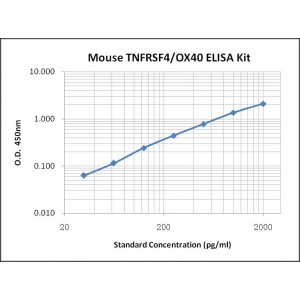More info
Assay Range | 31.2-2,000 pg/mL |
Sensitivity | 10.0 pg/mL |
Specificity | No cross-reaction with other related substances detected |
Size | 96T |
Storage | Store at 2 - 8ºC. Keep reconstituted standard and detection Ab at -20 ºC |
Assay Principle | Sandwich ELISA |
Sample Volume | 100 µL final volume, dilution factor varies on samples |
Sample Type | serum, plasma or cell culture supernatant |
Detection Method | Chromogenic |
Kit Components
1. Recombinant Mouse TNFRSF4 standard: 2 vials
2. One 96-well plate coated with Mouse TNFRSF4 Ab
3. Sample diluent buffer: 12 mL - 1
4. Detection antibody: 130 µL, dilution 1:100
5. Streptavidin-HRP: 130 µL, dilution 1:100
6. Antibody diluent buffer: 12 mL x1
7. Streptavidin-HRP diluent buffer: 12 mL x1
8. TMB developing agent: 10 mL x1
9. Stop solution: 10 mL x1
10. Washing solution (20x): 25 mL x1
Background
OX40, also known as tumor necrosis factor receptor superfamily member 4 (TNFRSF4), or CD134, is a member of the tumor necrosis factor receptor superfamily. Mouse OX40 is synthesized as a 256 amino acid (aa) type I transmembrane precursor protein with a putative 19 aa signal peptide, a 192 aa extracellular domain containing 4 TNFR cysteine rich repeats, a 25 aa transmembrane domain and a 36 aa cytoplasmic region. A naturally occurring soluble OX40 has also been identified in human serum. Mouse OX40 shares approximately 63% and 90% aa sequence identity with its human and rat counterparts, respectively. OX40 is a T cell activation antigen that is expressed primarily on activated CD4+ T cells, but is also expressed on activated human and mouse CD8+ T cells. OX40 is a receptor for OX40 ligand (OX40L)/gp34, a type II transmembrane glycoprotein of the TNF superfamily. Ligation of OX40 on T cells by OX40L or an agonistic antibody can promote clonal expansion, long-term T cell survival, and enhance memory T cell development. It has been showed that blockade of OX40L/OX40 interaction is useful for treating autoimmune disease and graft-versus-host disease in animal models.


